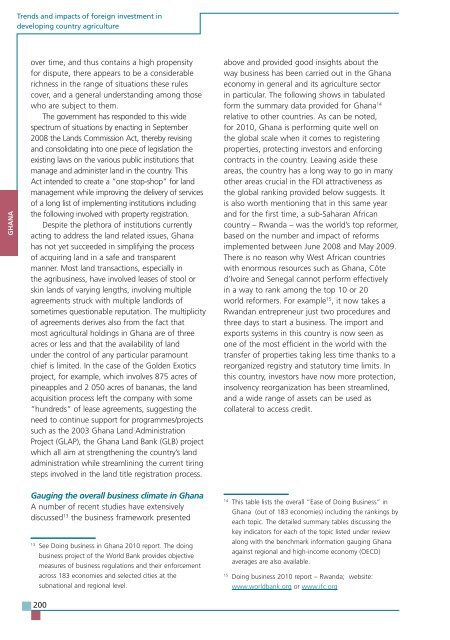TRENDS AND IMPACTS OF FOREIGN INVESTMENT IN DEVELOPING COUNTRY AGRICULTURE
TRENDS AND IMPACTS OF FOREIGN INVESTMENT IN DEVELOPING COUNTRY AGRICULTURE
TRENDS AND IMPACTS OF FOREIGN INVESTMENT IN DEVELOPING COUNTRY AGRICULTURE
Create successful ePaper yourself
Turn your PDF publications into a flip-book with our unique Google optimized e-Paper software.
GHANA<br />
Trends and impacts of foreign investment in<br />
developing country agriculture<br />
over time, and thus contains a high propensity<br />
for dispute, there appears to be a considerable<br />
richness in the range of situations these rules<br />
cover, and a general understanding among those<br />
who are subject to them.<br />
The government has responded to this wide<br />
spectrum of situations by enacting in September<br />
2008 the Lands Commission Act, thereby revising<br />
and consolidating into one piece of legislation the<br />
existing laws on the various public institutions that<br />
manage and administer land in the country. This<br />
Act intended to create a “one stop-shop” for land<br />
management while improving the delivery of services<br />
of a long list of implementing institutions including<br />
the following involved with property registration.<br />
Despite the plethora of institutions currently<br />
acting to address the land related issues, Ghana<br />
has not yet succeeded in simplifying the process<br />
of acquiring land in a safe and transparent<br />
manner. Most land transactions, especially in<br />
the agribusiness, have involved leases of stool or<br />
skin lands of varying lengths, involving multiple<br />
agreements struck with multiple landlords of<br />
sometimes questionable reputation. The multiplicity<br />
of agreements derives also from the fact that<br />
most agricultural holdings in Ghana are of three<br />
acres or less and that the availability of land<br />
under the control of any particular paramount<br />
chief is limited. In the case of the Golden Exotics<br />
project, for example, which involves 875 acres of<br />
pineapples and 2 050 acres of bananas, the land<br />
acquisition process left the company with some<br />
“hundreds” of lease agreements, suggesting the<br />
need to continue support for programmes/projects<br />
such as the 2003 Ghana Land Administration<br />
Project (GLAP), the Ghana Land Bank (GLB) project<br />
which all aim at strengthening the country’s land<br />
administration while streamlining the current tiring<br />
steps involved in the land title registration process.<br />
Gauging the overall business climate in Ghana<br />
A number of recent studies have extensively<br />
discussed 13 the business framework presented<br />
13 See Doing business in Ghana 2010 report. The doing<br />
business project of the World Bank provides objective<br />
measures of business regulations and their enforcement<br />
across 183 economies and selected cities at the<br />
subnational and regional level.<br />
200<br />
above and provided good insights about the<br />
way business has been carried out in the Ghana<br />
economy in general and its agriculture sector<br />
in particular. The following shows in tabulated<br />
form the summary data provided for Ghana 14<br />
relative to other countries. As can be noted,<br />
for 2010, Ghana is performing quite well on<br />
the global scale when it comes to registering<br />
properties, protecting investors and enforcing<br />
contracts in the country. Leaving aside these<br />
areas, the country has a long way to go in many<br />
other areas crucial in the FDI attractiveness as<br />
the global ranking provided below suggests. It<br />
is also worth mentioning that in this same year<br />
and for the first time, a sub-Saharan African<br />
country – Rwanda – was the world’s top reformer,<br />
based on the number and impact of reforms<br />
implemented between June 2008 and May 2009.<br />
There is no reason why West African countries<br />
with enormous resources such as Ghana, Côte<br />
d’Ivoire and Senegal cannot perform effectively<br />
in a way to rank among the top 10 or 20<br />
world reformers. For example 15 , it now takes a<br />
Rwandan entrepreneur just two procedures and<br />
three days to start a business. The import and<br />
exports systems in this country is now seen as<br />
one of the most efficient in the world with the<br />
transfer of properties taking less time thanks to a<br />
reorganized registry and statutory time limits. In<br />
this country, investors have now more protection,<br />
insolvency reorganization has been streamlined,<br />
and a wide range of assets can be used as<br />
collateral to access credit.<br />
14 This table lists the overall “Ease of Doing Business” in<br />
Ghana (out of 183 economies) including the rankings by<br />
each topic. The detailed summary tables discussing the<br />
key indicators for each of the topic listed under review<br />
along with the benchmark information gauging Ghana<br />
against regional and high-income economy (OECD)<br />
averages are also available.<br />
15 Doing business 2010 report – Rwanda; website:<br />
www.worldbank.org or www.ifc.org


